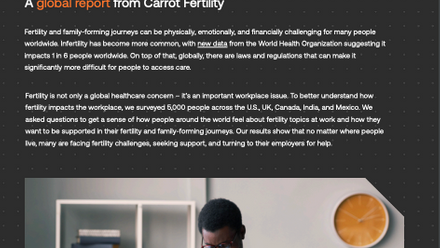Top three international wellbeing strategy challenges in a post-pandemic world

With light at the end of the tunnel, as vaccination programmes are rolled out globally, employers will need to do even more to support and retain their existing employees as well as attract the best talent.
Employees’ individual experiences of the pandemic will differ significantly. These differences provide unique wellbeing challenges expanding the full health spectrum of mental, physical, social and financial factors. Wellbeing is not one-dimensional neither does it look the same between employers.
We have talked to many multinationals throughout the pandemic about the challenges they have faced in terms of delivering an international employee benefits and wellbeing strategy since the crisis arose. One thing they all agree on is that the pandemic has been a catalyst for flexibility and adaptability.
Employers recognise that a global strategy must be flexible enough to account for the differences in culture, attitudes, regulation, benefit provision and healthcare systems.
For reward and benefit professionals, we are seeing three key challenges emerge in the post-pandemic environment:
1. Mental wellbeing
The pandemic has exacerbated existing mental health conditions as well as presenting mental health concerns to previously healthy people. There are many factors which may now be affecting employees’ mental wellbeing: prolonged social isolation due to lockdowns; digital fatigue; illness; bereavement; anxiety about returning to work; chronic uncertainty; and money worries as a result of job losses or being furloughed.
Globally, there have been rises in those seeking support for their mental health. According to recent research by the World Health Organization, 93% of countries worldwide reported a disruption to accessing mental health services, with demand outstripping supply.
2. Flexible working
Work location and patterns may have changed forever, and businesses previously without remote working policies have been forced to rapidly adapt. And in the absence of being in a physical workplace, so too have the communication methods that employers have adopted.
Effective communication will be vital in this “new virtual global transient world”.
3. Financial wellbeing
The pandemic has resulted in a divide between those who have coped well – the army of ‘accidental savers’ who have benefited – and those who have suffered financial hardship. Young people have been heavily impacted with three in five of those aged 16–24 stating that their personal finances have been negatively affected as a result of the crisis, according to LCP’s On Point (February 2021) report.
Reward will be challenged in managing increased anxiety around job security, financial risk and the trajectory of this happening in the future. Employers need to consider if they have the tools, education and support in place to help employees make informed financial decisions, whatever their situation and geographical location.
Overcoming these three challenges
The CIPD’s Health & Wellbeing at Work (March 2020) research reveals that for more than 60% of employers, wellbeing is topping the corporate agenda. For those without a wellbeing strategy in place, it is more important than ever to ensure you have the right measures to proactively look after employees’ wellbeing in the ”new” world. Employers with a strategy in place should check that it remains fit for purpose, reflects the current landscape and your employees’ evolving needs.
Services should be complementary to each other, address different needs, and be clearly communicated and easily accessible by employees.
Adopting a strategic approach to wellbeing helps to align an organisation’s culture, the environment in which it operates, and the support, policies and initiatives it provides its individuals. A strategy is fundamental to futureproof your business and to adapt to fluctuating environmental conditions in a post-pandemic world.
The authors are Adam Riley, director of global sales and Anna Spender, director of actuarial & data analytics at Howden Employee Benefits & Wellbeing.
This article is provided by Howden Employee Benefits & Wellbeing.
In partnership with Howden Employee Benefits & Wellbeing
Howden provides insurance broking, risk management and claims consulting services, globally. We work with clients of all sizes to provide dedicated employee benefits & wellbeing consultancy.







